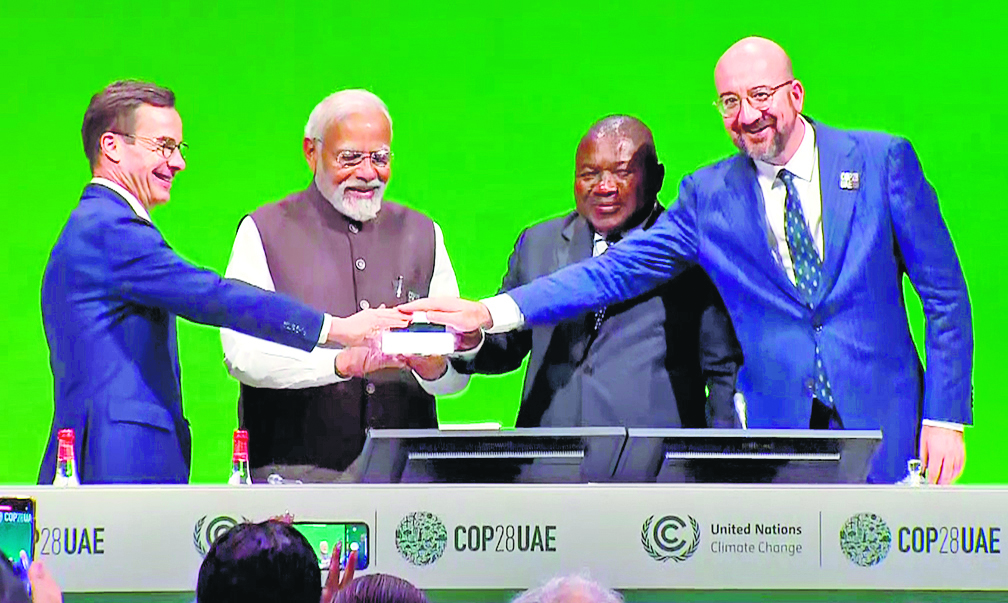For the COP28, India’s strategic objectives mirror the needs and aspirations of its people.
NEW DELHI
As the curtain rises on COP28 in Dubai, the global community turns its attention to India, a nation grappling with the intricate dance between economic growth, environmental sustainability, and the pressing need for climate action. Gone are the days of mere statistics and targets; instead, let’s delve into the heartbeat of India’s journey towards sustainable development, understanding the real challenges, progress, and strategic objectives that define its narrative at this critical juncture.
COP28 in Dubai made a significant move by creating a Loss and Damage Fund to aid countries affected by climate change. This decision, unprecedented for day one of any COP, could be a pivotal moment in global climate policy. However, it’s crucial to scrutinize whether this is a substantial progress or just a symbolic gesture amidst the broader climate efforts.
On the inaugural day of COP28 in UAE, Environment Minister Bhupender Yadav highlighted a noticeable surge in momentum. A key development unfolds with the decision to operationalize the Loss and Damage Fund, backed by contributions from developed nations. According to Yadav, “this fund is poised to propel essential climate actions in less developed areas, a move strongly endorsed by India for its transformative impact on a sustainable future.”
Meanwhile UNEP’s Fr. Executive Director Erik Solheim sees COP28 as a hub for global climate efforts. Governments, businesses, and activists unite for actions and deals. Reflecting on post-2009 progress, Solheim notes a 90% drop in solar prices, making coal replacement cost-effective. In diplomatic talks, he emphasizes the key issue of Loss and Damage, pushing for fair financial responsibility. Despite emission disparities, he doubts significant funding agreements, favoring nations like China and India prioritizing climate for domestic green growth and job opportunities.”

In the realm of renewable energy, India emerges as a frontrunner, not merely driven by global expectations but propelled by a genuine commitment to uplift the lives of its citizens. The adoption of solar power and substantial investments in solar infrastructure are not just environmental safeguards but pathways to opportunity for the people. Initiatives like the International Solar Alliance (ISA) exemplify India’s resolve to not only protect its own environment but to actively contribute to the global movement towards cleaner energy solutions.
India, cognizant of the economic potential in green technologies, strategically positions itself as a global player in the sustainability arena. Beyond reducing its carbon footprint, the nation eyes economic partnerships and opportunities by investing in solar and wind energy domestically. It seeks to become a provider of sustainable solutions on the international stage, aligning economic interests with geopolitical goals in the complex landscape of climate negotiations.
For the COP28, India’s strategic objectives mirror the needs and aspirations of its people. A paramount focus lies in recalibrating its nationally determined contributions (NDCs) under the Paris Agreement. This delicate balancing act involves aligning economic growth with cleaner energy alternatives, recognizing that the choices made resonate in the everyday lives of its citizens.
India’s call for international support and financing transcends the immediate need to address climate challenges. It is a clarion call for embracing new technologies that not only combat climate change but also catalyze economic growth and create opportunities for its people. The negotiation table at COP28 becomes a platform for India to assert its position on the global stage, advocating for fair and equitable partnerships that align with its economic interests and benefit its citizens.
However, navigating the path to sustainability is no stroll in the park for India. The nation grapples with the intricate dance of meeting energy demands for its growing economy while upholding sustainable practices. Striking this balance demands thoughtful decisions that prioritize the well-being of the people while propelling economic progress. It’s a challenge that underscores the complexity of India’s journey towards sustainability.
On the international front, collaboration is hindered by geopolitical obstacles. The success of climate action hinges on the willingness of developed nations to provide the financial and technological support crucial for developing nations like India. India’s negotiation prowess at COP28 becomes a linchpin in securing a global partnership that is not only fair and equitable but aligns with its economic interests and uplifts its people.
Yet, the challenges faced by India extend beyond the international stage. Addressing the social and economic impacts of climate change presents an intricate internal challenge. Striking the right chord between economic growth and inclusive policies that shield vulnerable communities demands astute political decisions and a deep understanding of the real-world dynamics shaping people’s lives.
As India takes center stage at COP28 in Dubai, its progress, strategic objectives, and economic challenges paint a vivid picture of the intricacies of climate diplomacy in a developing nation. This isn’t just about numbers and targets; it’s about the heartbeat of a nation, intricately woven into the fabric of its people’s lives. COP28 emerges as a stage for India to showcase not just its commitment to environmental stewardship but, more importantly, its commitment to the well-being and prosperity of its citizens.
Success at COP28 holds the promise of elevating India’s standing on the global platform. Beyond accolades, it positions the nation as a genuine advocate for the people in the global climate discourse. By aligning its political and economic interests with the needs of its citizens, India has the potential to set an example for the world—a testament that sustainability is not just a global goal but a commitment to improving the lives of people, one step at a time. As the world watches, India invites the global community to recognize the human aspect of sustainable development and join hands in crafting a future that leaves no one behind.
Rajesh Mehta is an international consultant in the field of market entry, innovation and public policy. Ashraf Nehal is a geopolitical analyst based out of London.

